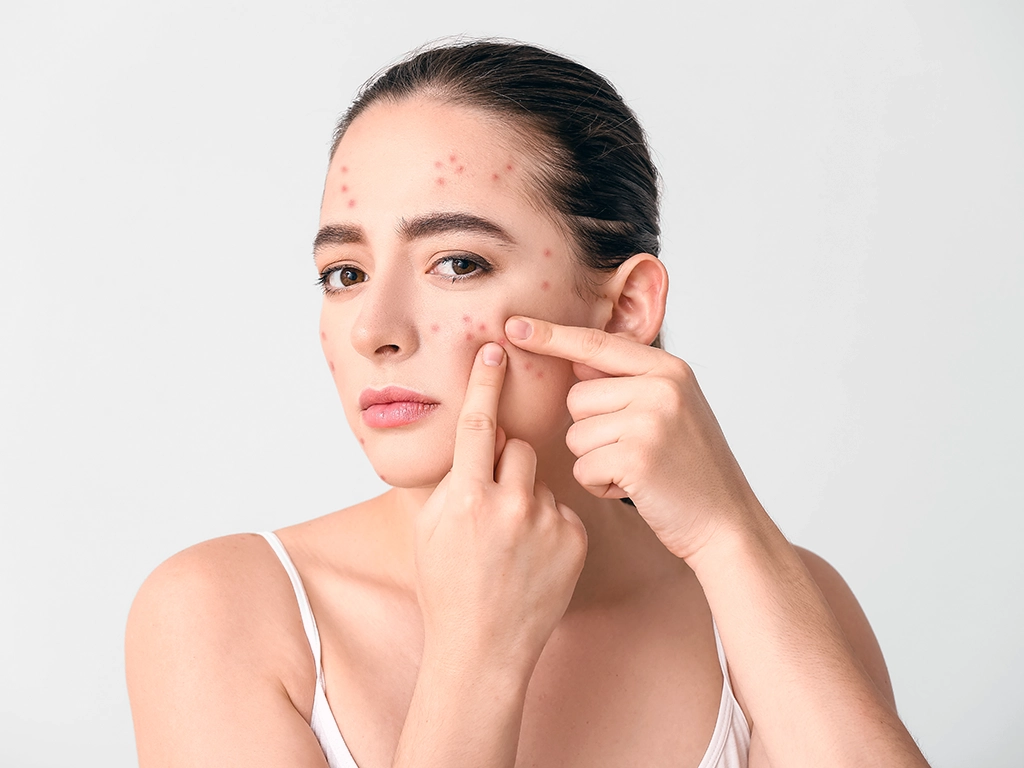
Hormonal Acne and Diet: What Your Skin’s Trying to Tell You
What is Hormonal Acne – And Why Is It So Stubborn?
Hormonal acne is driven by fluctuations in androgens, insulin, and inflammation — not just oily skin or clogged pores. It usually appears as:
- Painful cysts or nodules on the jawline, chin, and lower cheeks
- Breakouts that flare up before your period (in women)
- Acne that persists despite a good skincare routine
- Breakouts triggered by stress, lack of sleep, or dietary changes
At The Eterne Clinic, Powai Mumbai in Powai, we often see hormonal acne in patients with:
- PCOS (Polycystic Ovary Syndrome)
- Thyroid imbalances
- Post-pill acne (after stopping oral contraceptives)
- High glycemic diets or insulin resistance
How Diet Impacts Hormonal Acne
1. High-Glycemic Foods = More Breakouts
Eating foods that spike your blood sugar — think white bread, sugary cereals, soft drinks — causes insulin to surge. This, in turn, stimulates sebaceous glands and androgen production, worsening acne.
- Choose low-glycemic carbs: quinoa, oats, brown rice, sweet potato
- Focus on steady blood sugar to reduce hormonal acne flare-ups
2. Dairy May Not Be Innocent
Skimmed milk, in particular, has been linked to acne in multiple studies. It may alter hormonal pathways and affect insulin-like growth factors (IGF-1), both of which aggravate acne.
At The Eterne Clinic, Powai Mumbai, we often recommend a 2–4 week dairy-free trial to patients with chronic hormonal breakouts.
3. Processed Foods Trigger Inflammation
Excess salt, preservatives, and refined oils can increase systemic inflammation, making acne angrier, redder, and more persistent.
Swap seed oils and packaged snacks with:
- Omega-3-rich foods (flaxseed, walnuts, fish)
- Cold-pressed oils like olive or avocado
- Whole, unprocessed meals
Nutrients That Support Clearer Skin
When addressing hormonal acne treatment in Mumbai, we focus on correcting nutritional deficiencies that worsen acne, including:
- Zinc – reduces oil production and bacterial load
- Vitamin D – regulates immune function and inflammation
- Omega-3s – anti-inflammatory and hormone-balancing
- Magnesium – supports stress response and hormonal rhythm
- Probiotics – restore gut-skin axis balance
These may be prescribed in oral, IV, or dietary forms, depending on your skin condition and blood work.
How The Eterne Clinic, Powai Mumbai Treats Hormonal Acne Differently
We're not just another acne clinic in Mumbai — we treat acne as a complex internal condition. That’s why our approach includes:
1. Hormonal + Skin Diagnosis
We begin with:
- Hormonal profiling (androgens, LH/FSH, thyroid, cortisol)
- PCOS and insulin resistance screening
- Skin barrier analysis and acne mapping
2. Medical-Grade Acne Treatments
Depending on severity and skin type, we may combine:
- Topical + oral prescription treatments
- Chemical peels for adult acne
- LED light therapy for inflammation control
- Laser or carbon facials for acne-prone skin
- Oral anti-androgen medications if needed
3. Integrated Nutrition and Lifestyle Protocols
Your skin coach works closely with:
- Clinical nutritionist
- Hormonal expert
- Dermatologist
So that your acne treatment plan is customized and sustainable — not just surface-level.